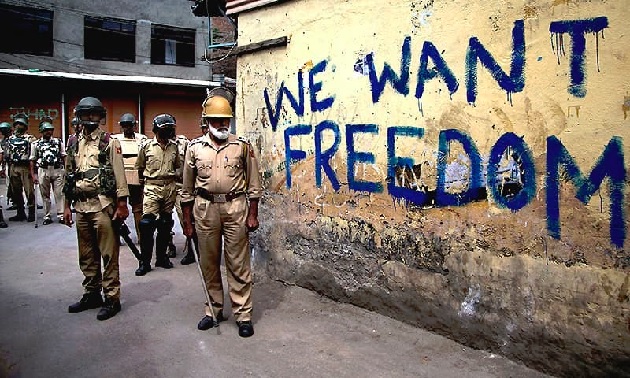Pakistan is facing an exceptionally dangerous challenge with aggressive rhetoric and threats from India and Afghanistan and hostile narratives gaining resonance in Washington. Failing to suppress the sustained uprising in India-held Kashmir, the Modi government has intensified its smear campaign against Pakistan in yet another attempt to portray the Kashmiri protest as Pakistan-inspired terrorism.
Following the attack on the Uri Indian army camp, India may heat up the Line of Control (LoC) to detract attention from its atrocities in the Valley. Pakistan should even be ready for worse.
In this trying situation, Pakistan can rely on diplomatic support from China and friends in the Islamic world. But much depends on our own defence preparedness and our diplomacy. We need to devise a policy response that helps reduce the threat without giving the Kashmiris a feeling of a let-down.
First we must address our vitiated relations with Kabul and Washington which have nosedived since the collapse of the quadripartite process. Regardless of the grave policy errors made since its intervention in Afghanistan, much like those made later in Iraq, Washington has chosen to blame Pakistan for its woes in Afghanistan. Both Washington and Kabul believe that sanctuaries in Pakistan sustain the Afghan Taliban insurgency in Afghanistan.
Our well-intentioned commitment to nudge the Taliban towards reconciliation, bring them to the negotiating table and our apparent eagerness to play a role have turned us into a Taliban accomplice. It is time to rethink our Taliban policy.
We must make a clear policy declaration that Pakistan cannot take any responsibility on behalf of the Afghan Taliban leadership and we would welcome direct contacts between them and the government or any political elements in Kabul for the purpose of reconciliation. We would still be willing to play a role only if specifically requested.
Secondly, we must reaffirm that we will do all we can to prevent use of our territory for militant activities inside Afghanistan and take visible measures for this purpose. This is our responsibility as a state. We cannot justify differentiated emphasis for Operation Zarb-i-Azb which attracts the accusation that we distinguish between “good and bad” Taliban. The suggested declaration to be made at the highest level, preferably as part of the prime minister’s UNGA address, will be a step in the right direction to bring down temperatures, particularly in our relations with Washington.
We must reflect why is it that Pakistan has ended up always siding with the most regressive elements in Afghanistan, some of whom we falsely regarded as assets, why most educated Afghans have become alienated from us and why we allowed our policy to fall in the insidious Afghan ethnic divide.
We must disavow pretentions of influence with the Taliban leadership. They and before them the Afghan Mujahedin leaders never acceded to our sincere advice for ending the conflict. We must be firm with the likes of the Haqqani group who cannot be allowed to abuse our hospitality.
We must also expedite fencing, consolidating and better managing the border. Promisingly, the government is showing seriousness in integrating Fata with Khyber Pakhtunkhwa. The perception of Pakistan’s erstwhile support to extremist militancy in Kashmir in the 1990s and our association with the Taliban have hurt Pakistan’s international image.
Of late, the delay in prosecuting especially those implicated in the Mumbai terrorist incident has been misconstrued as weak Pakistani commitment to fighting terrorism, the nemesis of all modern societies. This undermines Pakistan’s ability to forcefully advocate the Kashmir cause.
Nothing will help India more than an evidence of outside militant elements blending with the indigenous Kashmiri uprising to justify its extreme violence in India-held Kashmir and its aggressive posture against Pakistan. We should be open to cooperating with any investigation into the Uri attack.
This is, however, no time to reflect on what happened in the past. The ongoing Kashmiri struggle against repressive Indian rule, demands clear and emphatic expression of solidarity. The prime minister is expected to do so at the UNGA and in his meetings with world leaders.
The uprising in Kashmir is not Pakistan instigated as India claims. Kashmir is the oldest dispute on the agenda of the world body waiting international attention for its resolution.
Above all, it is the Kashmiris and the Kashmiri Diaspora, especially in the United States and the United Kingdom, who must fully mobilise themselves to agitate world conscience to their suffering and the denial of their fundamental rights. They have a vital role to play.
Pakistan should consult Kashmiri leaders from both sides of the LoC and from Diaspora and they must reach out to each other to chart out a course that corresponds to the wishes of the Kashmiri people. If offered, Pakistan cannot refuse a dialogue with India as the two nuclear-armed neighbours cannot afford a break in communications. However, Kashmiri leaders must be involved with the process for a settlement that ensures peace and enables Kashmiris to be masters of their own affairs and destiny.
Coutesy Dawn Newspaper.


